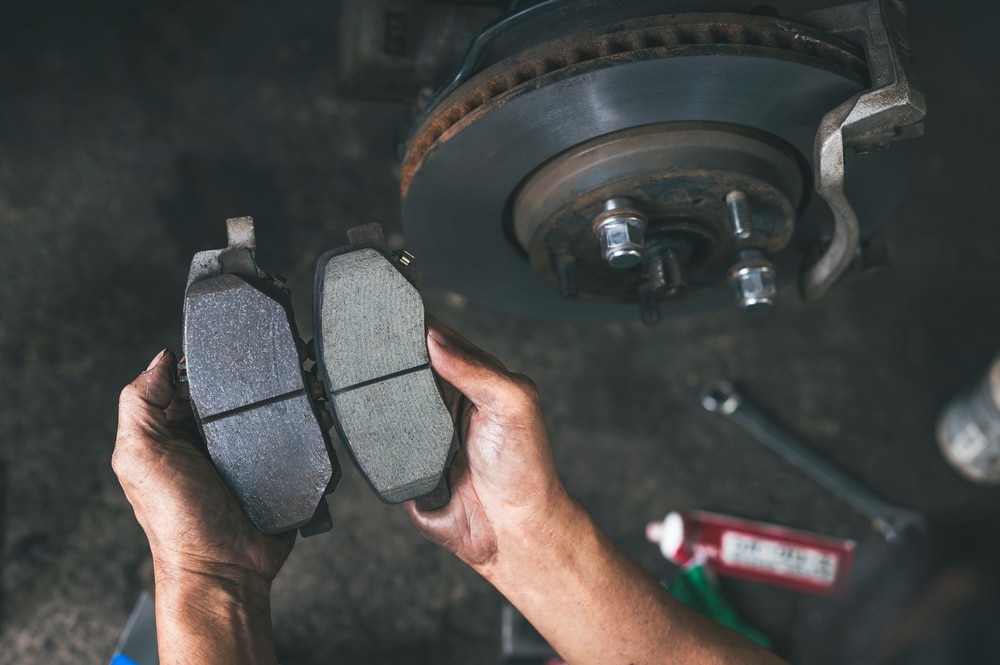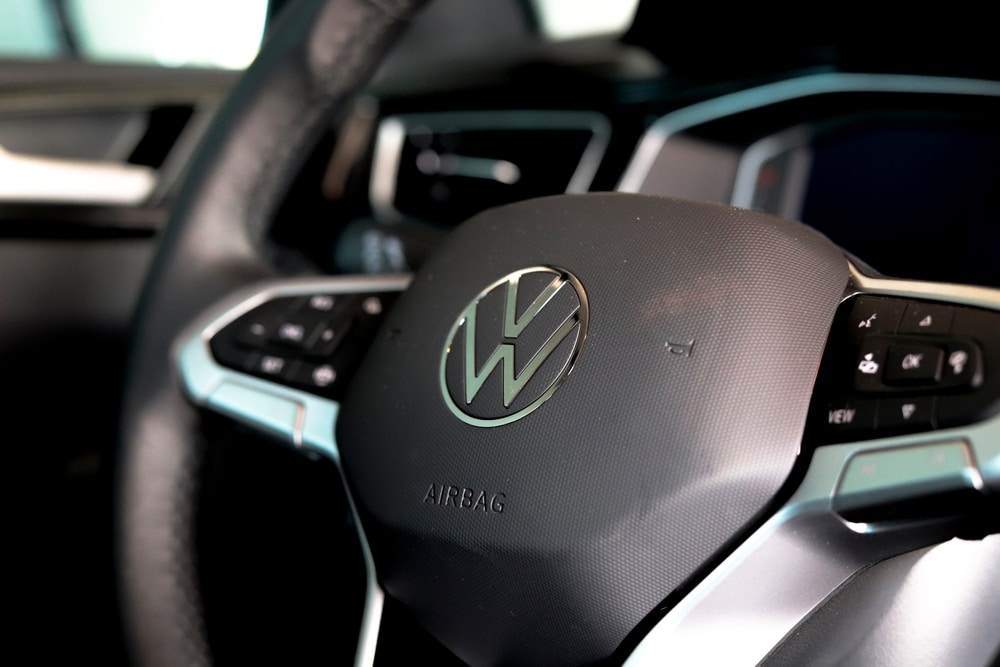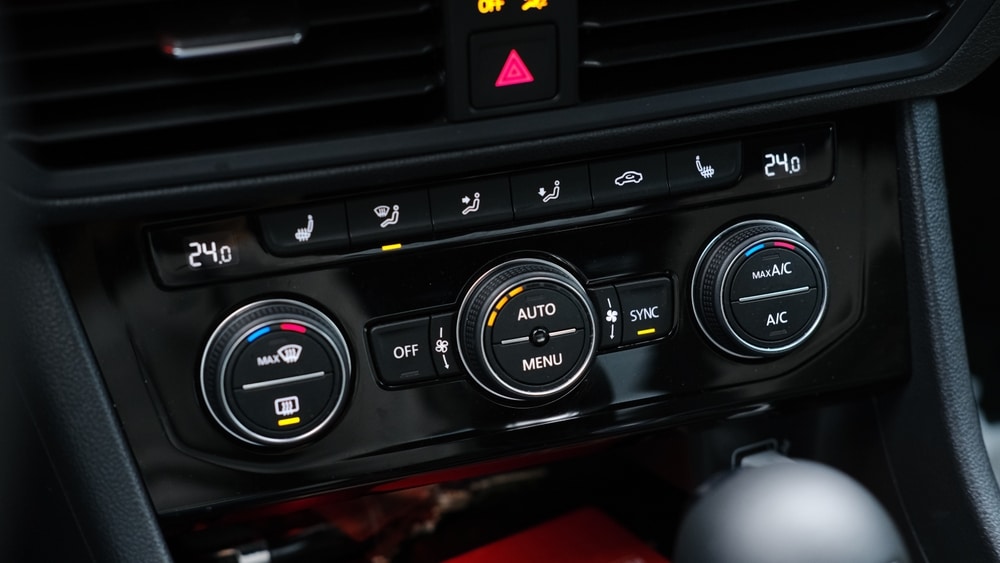Brake Pads
Brake pads are one of the most regularly replaced parts on your vehicle, but they’re not given much thought on a day-to-day basis. Until something changes: a noise, a warning light, or a softer pedal than usual.
This guide is here to help you take action before it gets to that point.
At CSN Autos, we’ve handled thousands of brake inspections and replacements — from routine maintenance to cases where worn pads have caused serious damage across the system. Using that experience, we’ve created this guide to help you understand what brake pads do, how they wear out, and what warning signs to look for before a small issue becomes a big one.
If you’re driving in or around Wymondham or Norwich, and want trusted advice from a multi-award-winning local garage, read on.
Let’s start with the essentials — what do brake pads actually do?
Brake Pads Explained: What They Do and How They Work
Let’s get straight to the point: brake pads are the components that allow your car to slow down safely. They sit inside the brake calliper and press against the brake discs every time you apply the brakes. (In some cars, the system uses drums and shoes instead, but the principle is the same).
These compact parts are built to handle a lot. When you press the brake pedal, hydraulic pressure forces the pads onto the rotating brake disc, creating the friction needed to bring the vehicle to a stop. That friction also creates heat — a huge amount of it. Brake pads are designed to absorb and manage that heat, but in doing so, they wear down over time.
Every time you brake, a thin layer of pad material is lost. That’s not a problem — it’s how the system is meant to work. But once the material becomes too thin, braking power starts to suffer. Leave it too long, and the backing plate will start to press against the disc, causing damage and turning a simple pad change into a much more expensive repair.
At CSN Autos in Wymondham, we check the condition of your brake pads during every service. If they’re wearing thin, we’ll let you know and explain your options clearly. No pressure, just honest advice.
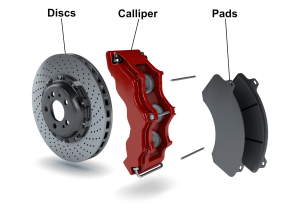
Brake Pad Types: Why They’re Not All the Same
Brake pads may all serve the same function, but they’re not all made the same way. The materials used in the pad directly affect braking performance, heat resistance, and wear rate; and every vehicle is designed to work with a specific type.
At CSN Autos in Wymondham, we always use pads that meet your vehicle’s exact specification. That means no cutting corners with cheaper, incompatible parts; only properly matched components that keep your braking system working as it should.
While we’ll always make sure the right pads are fitted, here’s a quick look at the most common types:
- Organic (NAO) pads: Made from fibres like cellulose, aramid, and other organic materials. These pads are typically quieter and smoother but tend to wear more quickly and don’t cope as well under high heat.
- Semi-metallic pads: These include steel or copper fibres for increased durability and braking force. They perform well under heat and load but are usually noisier and can wear down brake discs faster.
- Ceramic pads: Built with ceramic particles and copper fibres. These offer excellent heat control, low dust levels, and quiet performance. They’re often used in high-performance vehicles but tend to be more expensive.
It’s not about which pad is ‘best’, it’s about using the one that’s been designed to work with your braking system. Mismatched parts can reduce braking efficiency, create excess noise, or lead to uneven wear.
That’s why we take the decision out of your hands — and put safety first.
What Affects Brake Pad Wear and Why It Matters
Brake pads don’t all wear out at the same rate. At CSN Autos in Wymondham, we regularly see variations in wear depending on how the car is driven, how well it’s maintained, and what else is going on in the braking system.
Here are the main reasons brake pads wear down faster, and why that matters for your safety and repair costs:
- Calliper faults
If a calliper isn’t functioning properly, it may keep the pads in slight contact with the disc after braking. This continuous friction leads to uneven wear and can eventually damage the disc.
- Worn or corroded discs
When the surface of the disc is rough, warped, or corroded, the pads can’t make smooth contact. That reduces braking performance and wears the pads down more quickly and unevenly.
- Driving style and environment
Urban traffic, hills, short journeys, and towing all increase how often and how forcefully the brakes are used. This generates more heat and friction, which accelerates pad wear.
- Contamination and debris
Moisture, salt, and road dirt can build up inside the calliper or between the pad and the backing plate. This can lead to corrosion, and over time, may cause the friction material to detach, which is a serious safety risk.
- Wrong parts fitted
Pads that don’t match the vehicle’s original specification can wear too quickly, create braking imbalances, or generate excessive noise. That’s why we always use parts that match the manufacturer’s standards.
At CSN Autos, we inspect the full braking system, not just the pads, so we can catch these issues early and help you avoid bigger, more expensive repairs later on.
Brake Pad Wear: The Signs You Shouldn’t Miss
It’s unusual for brake pads to fail without warning; there’s usually a sign or two that something’s not right. If you can spot them early, you’ll not only stay safer but potentially avoid more expensive repairs later on.
Here’s what to listen for and keep an eye on:
- Screeching or squealing
Many brake pads include a built-in wear indicator (a small metal tab that creates a high-pitched noise when the pad material gets low). If you hear it, that’s a clear sign your brakes need checking soon.
- Grinding noises
A harsh grinding sound could mean the pad has completely worn through, and the metal backing plate is now contacting the disc. This seriously reduces braking performance and usually means disc damage has already started.
- Brake warning light
If your vehicle has wear sensors, a warning light will appear on your dashboard when the pads are reaching the end of their life. This is a direct prompt to book a brake inspection and not something to ignore.
- Changes in braking feel
If the brake pedal feels soft, spongy, or your stopping distance increases, it could be linked to brake pad wear or another fault in the system.
At CSN Autos, we treat these symptoms seriously. If anything feels off, we’ll inspect the entire braking system and give you a clear, honest explanation of what’s happening, with no pressure or upselling.
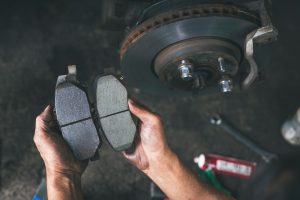
Why Brake Pads Shouldn’t Be Left Too Long
A small delay might not seem like a big deal, especially if your brakes still feel fine — but with brake pads, waiting too long can lead to both safety risks and a more expensive repair.
Brake pads are built to wear down gradually. That’s how they’re designed. But once they reach the end of their usable life, that wear speeds up. With little friction material left, the metal backing plate begins to press directly against the brake disc, and that’s when the damage spreads fast.
At that point, it’s no longer just a brake pad replacement. You’re likely looking at new discs as well, which means more cost and more time off the road. In some cases, the heat and imbalance caused by worn-out pads can also affect callipers and brake fluid.
At CSN Autos in Wymondham, we’ve seen how quickly a minor issue can escalate when action is delayed. That’s why we recommend having your brakes inspected as soon as you notice a warning sign, or if it’s simply been a while since your last check.
Taking action early helps protect your car and your wallet — but more importantly, it keeps your braking system ready when it matters most.
Brake Pad Checks and Replacements You Can Rely On
Brake pads might be small, but their role in your car’s safety couldn’t be more important. Just like tyres, wipers, and lights, they need to be checked before they fail, not after.
At CSN Autos, we carry out every brake pad replacement using parts that match your vehicle’s original specification. Our trained technicians follow strict procedures to ensure the work is done to the highest standard, with no unnecessary upsells or shortcuts.
Book Your Brake Pad Check with CSN Autos in Wymondham
We’re proud to have been named South Norfolk Small Business of the Year 2024, a Top Garage Finalist in 2023 and 2024, and Best Auto Repair Centre 2023 Norfolk by the SME Southern Enterprise Awards.
We offer a 12-month parts and labour guarantee on all work, and we support drivers in Wymondham, Norwich, and the surrounding area with honest, dependable brake servicing.
We have a {{average-rating}} star Google rating from {{review-count}} satisfied customers, and we’re here when you need us.
Call 01953 425983 today to book your brake pad check with CSN Autos.
